|
|
|
Sort Order |
|
|
|
Items / Page
|
|
|
|
|
|
|
| Srl | Item |
| 1 |
ID:
119768
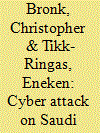

|
|
|
| 2 |
ID:
127694


|
|
|
|
|
| Publication |
New Delhi, Shipra Publications, 2014.
|
| Description |
xxix, 249p.Hbk
|
| Standard Number |
9788175417298
|
|
|
|
|
|
|
|
|
|
|
|
Copies: C:2/I:0,R:0,Q:0
Circulation
| Accession# | Call# | Current Location | Status | Policy | Location |
| 057591 | 327.54059/BHA 057591 | Main | On Shelf | General | |
| 057598 | 327.54059/BHA 057598 | Main | On Shelf | General | |
|
|
|
|
| 3 |
ID:
142718
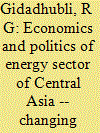

|
|
|
|
|
| Summary/Abstract |
Central Asia is one of the energy resource rich regions in the world. For the post-Soviet sovereign and independent Central Asian States (CAS), energy sector has assumed special political and economic significance during the last two decades. The leadership of the CAS has to deal with the geo-political influence of the global powers apart from the fact that their energy sector, being integrated with the global energy market, has also to deal with the cost and benefit of fluctuating international demand and price for oil.
|
|
|
|
|
|
|
|
|
|
|
|
|
|
|
|
| 4 |
ID:
108043


|
|
|
|
|
| Publication |
2011.
|
| Summary/Abstract |
The geographic proximity of Central Asia to Russia, China, the Caucasus and the Caspian region, as well as to the Middle East, makes this oil and gas-producing region a crucial and ever-developing player in regional and global energy markets. The method by which Central Asian producers choose to develop their hydrocarbon resources and export infrastructure will have significant implications for the plans for diversification of oil and gas supplies of Europe, China and India, as well as for Russia's energy exports to Europe. It is still too early to tell whether the economic and political incentives are strong enough to promote cooperation between the various actors or whether the energy interests of these key external powers are so diverse as to clash in Central Asia.
|
|
|
|
|
|
|
|
|
|
|
|
|
|
|
|
| 5 |
ID:
120060
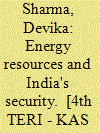

|
|
|
|
|
| Publication |
New Delhi, Konard Adenauer Stiftung, 2010.
|
| Description |
xii,88p.pbk
|
| Series |
KAS Publication Series No. 30
|
|
|
|
|
|
|
|
|
|
|
|
Copies: C:1/I:0,R:0,Q:0
Circulation
| Accession# | Call# | Current Location | Status | Policy | Location |
| 057217 | 333.790954/SHA 057217 | Main | On Shelf | General | |
|
|
|
|
| 6 |
ID:
123636
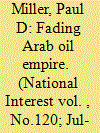

|
|
|
|
|
| Publication |
2012.
|
| Summary/Abstract |
PRESIDENT OBAMA'S pivot to East Asia is well-timed. The geostrategic importance of the Middle East is vastly overblown. The region matters to the United States chiefly because of its influence in the world oil market, but that influence has been in terminal decline for a generation, a fact almost wholly unnoticed by outside observers. A confluence of developments-including rising prices and production costs, declining reserves, and the availability of alternate fuels and unconventional sources of oil-will decisively undermine the defining role of the Middle East in the global energy market. Meanwhile, the United States has vital interests at stake elsewhere in the world at least as pressing, if not more so, than its interests in the Middle East. These include thwarting the proliferation of weapons of mass destruction, fighting transnational terrorism and maintaining stability in key strategic locations of the world.
|
|
|
|
|
|
|
|
|
|
|
|
|
|
|
|
| 7 |
ID:
126748
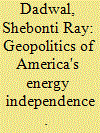

|
|
|
|
|
| Publication |
New Delhi, Institute for Defence Studies and Analyses, 2013.
|
| Description |
87p.Pbk
|
| Series |
IDSA Monograph Series No.30
|
| Standard Number |
9789382169291
|
|
|
|
|
|
|
|
|
|
|
|
Copies: C:2/I:0,R:0,Q:0
Circulation
| Accession# | Call# | Current Location | Status | Policy | Location |
| 057539 | 333.8230973/DAD 057539 | Main | On Shelf | General | |
| 057540 | 333.8230973/DAD 057540 | Main | On Shelf | General | |
|
|
|
|
| 8 |
ID:
116430
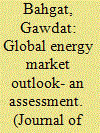

|
|
|
| 9 |
ID:
154244
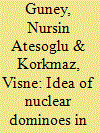

|
|
|
| 10 |
ID:
153490
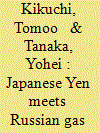

|
|
|
|
|
| Summary/Abstract |
How can Russia and Japan cooperate to contribute to stability and prosperity in the Asia-Pacific region? With 48 trillion cubic meters Russia has the world's largest natural gas reserve while Japan has the world's largest net foreign asset of $3.2 trillion. Linking the two affluent resources creates new transactions and opportunities for the world economy. The implication will be far-reaching beyond the sphere of mere economics and will change the energy and financial world dominated by oil from the Middle East and the USD. For example, Japan imports 82% of its oil from the Middle East--Saudi Arabia (34%), UAE (25%), Qatar (8%), Kuwait (8%), and Iran (5%). On the other hand, the USD is used for 42.09% of international payments and is dominant particularly in Asia where regional currencies such as the Japanese yen (JPY) and the Chinese yuan (CNY) are used only for 3.4% and 1.68% of international payments, respectively.
|
|
|
|
|
|
|
|
|
|
|
|
|
|
|
|
| 11 |
ID:
127293


|
|
|
|
|
| Publication |
2014.
|
| Summary/Abstract |
This paper describes and analyses the multi-actor governance process that made Mozambique the first African nation-state to develop a national policy framework for sustainable biofuels. The paper draws on findings from action research conducted in Mozambique between December 2008 and July 2012. We analyse interactions between the changing governance context, the course of the multi-actor governance process, and the choices in relation to governance framework characteristics and content for four successive stages of governance framework development. This provides the basis for reflection on the competences required for effective multi-actor sustainability governance, and a discussion about the role of the nation-state in sustainability governance of global economies such as biofuels.
The governance framework for sustainable biofuels has contributed to a more transparent and secure investment climate for biofuels in Mozambique. Key factors for success were (1) the presence of different types of competences during the various stages of the governance framework development, (2) closing the gap between 'licences to sell' and 'licences to produce' across different governance levels, and (3) balancing between the short- and long-term objectives for biofuel production in Mozambique and requirements of global biofuel markets. Developing-country nation-states can provide an essential contribution to these success-factors for global governance of sustainable biofuels.
|
|
|
|
|
|
|
|
|
|
|
|
|
|
|
|
| 12 |
ID:
133774
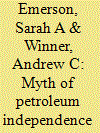

|
|
|
|
|
| Publication |
2014.
|
| Summary/Abstract |
U.S. politicians often work the topic of oil import independence into their campaign rhetoric as an ideal that would help separate U.S. economic prosperity and military responsibility from the volatility of Middle Eastern politics. In theory, oil independence would mean that events such as the Iranian revolution or internal political unrest in key Arab oil producers would have much less direct impact on the flow of oil to the United States, and thus U.S. prosperity (even if, in a global market for oil, the price impact of any supply disruption is shared by all consuming countries). More importantly, intra-state conflicts such as the Iraq-Iran war or the Iraqi invasion of Kuwait would not necessarily require large-scale U.S. military involvement to ensure oil production and exports to the United States and its allies. This linkage between U.S. oil import dependence and military commitment to the Gulf region has given rise to a myth favored by policymakers, markets, and the public that if the United States could attain oil independence, we could also reduce our military responsibilities around the world. Recent and ongoing changes in both the oil sector and in political-military strategy are for the first time in forty years combining in a manner that is leading some to believe this story could come true.
|
|
|
|
|
|
|
|
|
|
|
|
|
|
|
|
| 13 |
ID:
140501


|
|
|
|
|
| Publication |
Oxford, Oxford University Press, 2015.
|
| Description |
xii, 257p.: figureshbk
|
| Standard Number |
9780190212698
|
|
|
|
|
|
|
|
|
|
|
|
Copies: C:1/I:0,R:0,Q:0
Circulation
| Accession# | Call# | Current Location | Status | Policy | Location |
| 058287 | 338.272820973/YET 058287 | Main | On Shelf | General | |
|
|
|
|
| 14 |
ID:
130464


|
|
|
|
|
| Publication |
2014.
|
| Summary/Abstract |
Nuclear power remains the best way to produce large amounts of electricity reliably for homes and businesses. That is why the continuing deficit in nuclear innovation is so troubling, and why Washington needs to seek additional strategies to incentivize and support progress.
These days, the long-term role that nuclear power will play in the global energy market remains uncertain. That would have come as a surprise to the scientists and engineers who, during the 1950s and 1960s, pioneered the study of nuclear fission, built test reactors, and designed nuclear-powered airplanes and rockets. They would also have been surprised, and likely dismayed, that the light-water reactor -- the technology that powered the first nuclear submarine, in 1954 -- remains the dominant commercial technology for producing fission energy.
|
|
|
|
|
|
|
|
|
|
|
|
|
|
|
|
| 15 |
ID:
127900


|
|
|
|
|
| Publication |
2014.
|
| Summary/Abstract |
With the European Strategic Energy Technology Plan (SET Plan) expiring in 2020, the EU needs to revisit its energy technology policy for the post-2020 horizon and to establish a policy framework that fosters the achievement of ambitious EU commitments for decarbonization by 2050. We discuss options for a post-2020 EU energy technology policy, taking account of uncertain technology developments, uncertain carbon prices and the highly competitive global market for energy technologies. We propose a revised SET Plan that enables policy makers to be pro-active in pushing innovation in promising technologies, no matter what policy context will be realized in the future. In particular, a revised SET Plan should include a more technology-specific focus, provide the basis for planning and prioritization among decarbonization technologies, and should be based on a comprehensive approach across sectors. Selected technology targets and EU funding of innovation should be in line with the SET Plan prioritization.
|
|
|
|
|
|
|
|
|
|
|
|
|
|
|
|
| 16 |
ID:
106740
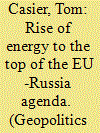

|
|
|
|
|
| Publication |
2011.
|
| Summary/Abstract |
Over the last decade we have witnessed an increasing politicisation of the energy discourse. Today energy relations of the EU are framed in terms of excessive dependence on Russia, qualifying the latter as a security threat. This article puts forward four criteria to define energy relations in security terms: supply vulnerability of the EU, the absence of Russian demand dependence, the dominance of energy over other capabilities, the willingness to link energy to foreign policy objectives. Little support is found to define the dependence on the import of Russian energy resources as a security issue. An alternative explanation is given, attributing growing energy concerns to shifting identities and perceptions in EU-Russia relations, which have contributed to understanding energy relations in competitive and geopolitical terms. Russia has developed a more assertive energy diplomacy, while in the EU sensitivity over energy dependence has grown as a result of changes on the global energy market and of the 2004 enlargement.
|
|
|
|
|
|
|
|
|
|
|
|
|
|
|
|
| 17 |
ID:
062909
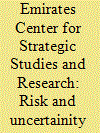

|
|
|
|
|
| Publication |
Abu Dhabi, ECSSR, 2004.
|
| Description |
xv, 227p.
|
| Standard Number |
9948005724
|
|
|
|
|
|
|
|
|
|
|
|
Copies: C:1/I:0,R:0,Q:0
Circulation
| Accession# | Call# | Current Location | Status | Policy | Location |
| 049764 | 333.79/EMI 049764 | Main | On Shelf | General | |
|
|
|
|
| 18 |
ID:
137220
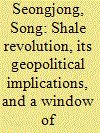

|
|
|
|
|
| Summary/Abstract |
The shale oil and gas production boom has played a significant role in bringing about the recent precipitous fall in oil and gas prices, and in catapulting the United States into first place for oil production last year, ahead of Saudi Arabia. A number of factors at the core of the boom in the United States have contributed to its success: the combination of technological breakthroughs (e.g., horizontal drilling and hydraulic fracturing); talented entrepreneurship; a business-friendly financial
market; technological R/D initiatives supported by the government; favorable geological conditions; and the property-rights regime. The EU and Asia also stand to gain from the shale windfall; Russia, Saudi Arabia, Iran, and other OPEC members, on the other hand, are facing seriously negative impacts. Northeast Asia—particularly the Republic of Korea (ROK), China, and Japan—may have an
opportunity to benefit from the “Shale Revolution,” with the potential emergence of natural gas trading hubs in the region. This paper seeks to (1) identify the current status of the Shale Revolution, including the factors responsible for its success and the role of entrepreneurship in the shale breakthrough; (2) examine the geopolitical implications of the shale boom on important global players; and (3) explore the window of opportunity that is now open to nations in the Northeast
Asia region related to the Shale Revolution.
|
|
|
|
|
|
|
|
|
|
|
|
|
|
|
|
|
|
|
|
|